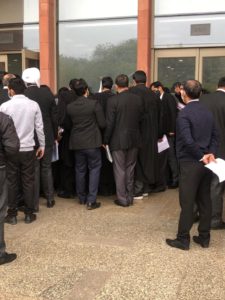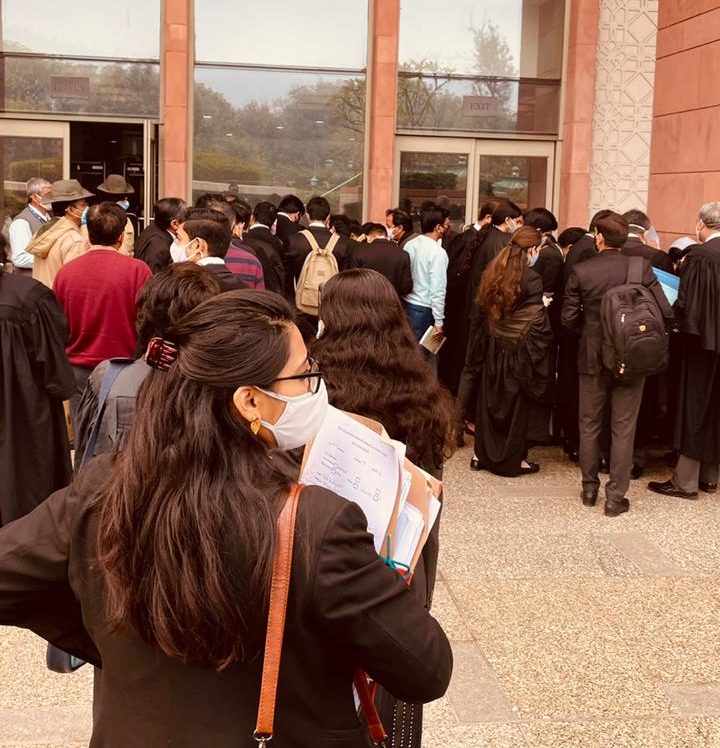Delhi lawyers are worried about safety from Covid-19 infection but most want normal functioning of courts — a few feel the online mode has its advantages
Lawyers practising in Delhi’s Tis Hazari and the Delhi High court believe that physical hearings are required now just as everything else is starting to function normally. But not all. As on 20 January, Supreme Court disposed of the petitions challenging the Delhi High Court’s decision to resume physical hearings, saying: “We trust the Chief Justice of Delhi High Court will take a proper decision.
While some semblance of normalcy is being brought to the judiciary with the 14 January order – Delhi High Court decided to resume physical hearings at 11 of its benches and on alternate days for the district courts in Delhi with effect from January 18 – many are unhappy about the risks.
Anil Tomar, lawyer and Bar council vice president of Tis Hazari court, however, believes that after the ‘trial run’ – the order for the courts functioning is till the end of the month – is seen as a success, by February all courts will open. “For a long time, we have wanted them to open the court. All government offices are open, even some private ones. Regular functioning started but court was the only one which didn’t.”
He says that some may complain about the decision, but video conferencing (VC) is not an appropriate medium. “In the VC one can do miscellaneous work, but things like a final argument, or evidence collection can’t be done over VC that well.”
His other argument is that lawyers have been coming to their chambers, looking at files and meeting litigants – with Tis Hazari even starting a fraction of the physical hearings from September of last year – the only difference now is that there will be more appearances before the bench. “I have been coming and have also presented myself before the court on a few occasions. But yes, there were many for whom January 18th was the first time after a very long time. They met their friends after a long time, and the experience was very different in presenting your case. It was nice, video conferencing was not quite the same. Here there’s more satisfaction, zameen asman ka pharak hain” (as different as land and sky).
And while he tries to focus on the positives, he does agree that Covid protocols were not being followed stringently with “fear in some way leaving people”. And this fear is exactly what is making some lawyers question the safety factor and oppose the risk they are having to take, with no option available to choose to have a video conference instead of in-person, physical hearings.
Two lawyers practicing at the Delhi High Court told us the crowds on Monday were not controlled as required under the social distancing norms for Covid safety. Photos too show how many lawyers had gathered together but despite the close quarters and risk, the two still back the courts regaining normalcy. One of them is Advocate Mehak Nakra, who instead points to the problem of having both virtual and physical hearings taking place in tandem.

“There were quite a few people but because it was the first day, I think they were unable to manage. The only problem is that half of the matters are in virtual courts and the other half in physical courts so lawyers have to look for networks and manage both the ways. The High Court has an e-library but everyone was facing this problem.”
Even as some lawyers may want things to go back to as before Covid, the national capital has recorded as many as 231 fresh cases on 19 January. According to the latest bulletin issued by the Delhi health department, 2,334 active Covid cases and 10 deaths were recorded in the last 24 hours.
Some of the most recent objections come from five women advocates who have submitted a writ petition in the Supreme Court, calling the order to start physical hearings as “infringing the fundamental rights guaranteed under Articles 14, 19 & 21 of the Constitution of India.”
The question if the risk is worth it comes after courts start functioning at about 50% of capacity after a year which has thrown the justice system up in the air – a system which was already heavily under the burden of piled up cases. For the month of December 2020 alone from Tis Hazari Court there were a total of 4,092 cases pending.
So, the fact that district courts have also been permitted to record evidence (except in those cases where the accused is in custody), Paras Gaur, a criminal lawyer at the Tis Hazari Court, finds the scales tipping towards the normal functioning of courts. “Many cases were stuck and unable to proceed. The fact that evidence can be recorded, and hearings will take place in a smoother manner because it being face-to-face, I think it’s a good decision”.
“Also, there are many lawyers who earn on a daily wage; their earnings were severely affected. The re-starting of the court was necessary for them and also especially so that the judiciary starts working as normal again.”
While both sides of the debate present a good argument, giving an option to those who would want to work in the safety of their virtual worlds seems like a sensible option.
(Cover image: Lawyers outside Delhi High Court // Credit: Adv Mohit Gupta)





